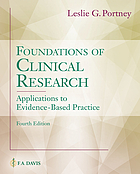
Step 1: Defining your research question
Before you formulate your research question it's important to consider if you're looking for background or foreground information so that you can consult the best resources.
Background Questions:
Answers questions about general knowledge and can best be answered using textbooks or narrative reviews. Background questions often answer the who, what, where, when, how, or why? These questions are best answered using textbooks, so you may want to consult McGill's Library catalogue when searching for this information.
***If you’re looking for answers about an illness/disease/condition, a process, or tool/object/instrument, you are probably asking a background question.
Foreground Questions:
Generally, foreground questions are specific to patient care or research. They often focus on a particular patient or population and involve comparisons between two options. These questions are best answered using primary sources and typically require evidence-based information. In addition to our library catalogue, you may want to consult any of the core databases.
***Foreground questions will require you to engage in a rigorous search process, utilizing databases and other resources.
The ultimate goal of research is to develop, refine, and expand knowledge. Your research question defines the specific inquiry you aim to address to resolve the research problem.
Research questions are translated into search queries, which are then used in databases such as Ovid MEDLINE, PubMed, Embase (Ovid), CINAHL (EBSCOhost), Web of Science Core Collection, and Scopus, among others.
There are several things to consider when designing your research question. If you need guidance, the worksheet below can help you formulate your question.
Or, you could consider using a question formulation framework to help identify the key concepts that will guide your search strategy.
Several frameworks exist for formulating questions. In health sciences, one of the most commonly used is PICO, which works best for questions about interventions or exposures. However, using a framework is not mandatory when developing your question. See, what happens if your question doesn't fit into PICO?
Other question formulation frameworks include:
PICOT (Population, Intervention, Comparison, Outcome, and Time frame)
PIE (Problem, Intervention, Evaluation)
CoCoPop (Condition, Context, Population)
SPICE (Setting, Perspective, Intervention, Comparison, Evaluation)
PECO (Population, Exposure, Comparison, Outcome)
PCC (Population, Concept, Context)
FINER (Feasible, Interesting, Novel, Ethical, Relevant)
 Foundations of Clinical Research : Applications to Evidence-based Practice
by
Leslie G. Portney
Foundations of Clinical Research : Applications to Evidence-based Practice
by
Leslie G. Portney
Please note: While this guide is managed by the Schulich Librarians, the contents of the guide were developed in collaboration with Yvon-Tani Jackson, MISt student (2026).
McGill Libraries • Questions? Ask us!
Privacy notice